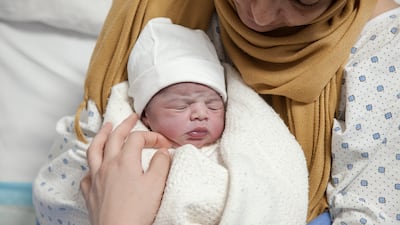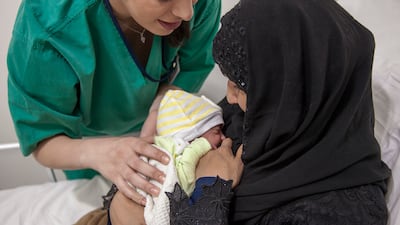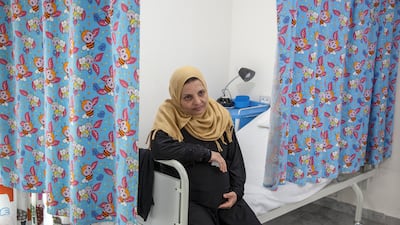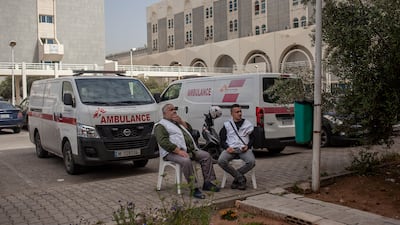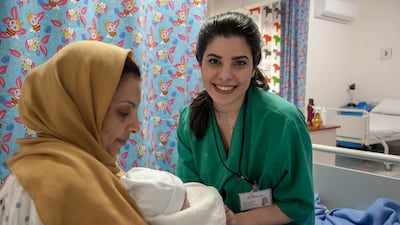Eva Mousa had always planned to give birth in hospital.
But after the 19-year-old housewife's husband Mohammad ended up being admitted himself following a motorbike accident, the pair were left financially depleted and indebted. The young, previously middle-class family — newly impoverished, like many in the financially struggling country of Lebanon — have been forced to think of alternative options for childbirth.
With only five months to go until the arrival of their daughter, the young mother said the prospect of incurring further debt influenced their decision to have the pregnancy attended to by a midwife rather than an obstetrician.
They had borrowed from friends and family to afford the cost of Mohammad’s week-long hospital stay and an operation on his leg. It broke them so much financially that Mrs Mousa was left wondering "how on earth could we afford to have a family?"
Following the advice of a cousin who had recently given birth at a midwife-operated clinic in the mountain town of Aley, Mrs Mousa decided to carry her pregnancy to term under the watch of the same midwife.
Her anxiety over deviating from the norm of giving birth in hospital vanished after her first check-up.
“Immediately I was more comfortable than if I had gone to the hospital,” Mrs Mousa said of the quality of care she received. Her daughter Mariam is now a healthy six months old, cooing and smiling under a bundle of blankets.
“I felt like the qabila” — the Arabic term for midwife — “knew exactly what to say and how to act and she was more personable than a doctor.”
The delivery procedure cost the family about 2 million Lebanese pounds or the equivalent of $45 on today’s market rate. By comparison, the average cost of childbirth in a Lebanese hospital is $350 to $500, although some private hospitals charge thousands of dollars.
The cost of childbirth — not to mention pre and postnatal care — has become almost insurmountable in Lebanon’s crumbling economy. Now in its fourth year, Lebanon’s financial meltdown has pushed two thirds of its population into poverty. Inflation is at an all-time high, and the local currency is worth a mere fraction of what it once was. The average public sector employee makes less than $50 a month.
A rise in demand for midwives
A midwife is a qualified and accredited clinical professional who provides specialist care to mothers and newborns. They work with women in labour to enable childbirth, in addition to working with mothers in the prenatal and postpartum stages.
Medical studies on midwifery-led models say the benefits include lowered rates of unnecessary and potentially harmful medical procedures such as Caesarean and labour inductions, higher rates of breastfeeding and significantly increased rates of satisfaction in women when it came to quality of care before, during and after birth.
Most patients cite financial reasons as a major reason for their decision to give birth accompanied by a midwife, Dr Rima Cheaito, head of the Order of Midwives in Lebanon told The National.
The order recorded a "definite increase" in midwife-enabled births following Lebanon's economic severe downturn, Dr Cheaito said.
Births delivered through midwives in private clinics more than doubled in the first three years of the economic crisis: from 2,095 in 2019 deliveries to 4,800 last year.
Marginalised and limited despite surging popularity
In Beirut’s Rafic Hariri University Hospital, Lebanon’s largest government hospital, Batoul Al Hamad cradles two day old Yousef. He is her second child to be born with the aid of a midwife.
“Women I knew, neighbours and friends, had told me about their experiences and advised me. But I still had reservations because it’s a different way of giving birth than we’re accustomed to,” the 27-year-old Syrian mother told The National.
“Back then I took their advice and tried it. And here I am again for Yousef, because I’m comfortable here.”
The midwife birthing centre in Rafic Hariri hospital — run by medical NGO Medecins Sans Frontieres (MSF) — became the only hospital-based, midwife-led birthing unit in the nation when it relocated from the Shatila camp for Palestinian refugees in 2018.
According to Public Health Minister and previous director of RHUH, Firas Al Abiad, hosting the unit in a government hospital was partly an initiative to empower the midwife-led model in Lebanon and answer its detractors.
The majority of patients at the birthing centre are Syrian and Palestinian refugees, and domestic migrant workers.
“It’s a comprehensive service free of charge and open to whoever wants to give birth in the area so long as they fit the criteria,” said Charlotte Massardier, MSF's advocacy manager.
She said MSF staff had witnessed an increase in the number of economically vulnerable Lebanese patients coming to the centre since the start of crisis in 2019.
But with the resources of the Health Ministry and various international aid organisations stretched thin, Dr Al Abiad said there was no capacity to expand the midwife-led model to other hospitals.
"We are looking at how we can even preserve the current model, never-mind expand it, because we’re not sure for how long MSF can maintain it," he said. The Health ministry was studying ways to independently support the birthing centre, he added.
Aside from the MSF unit, women who desire the care of a midwife must make appointments in private clinics — a significant point of contention for advocates of the practice who say midwives are marginalised in Lebanon’s healthcare system.
Midwives v the system
“As a woman in Lebanon you don't have many options,” said Dr Tamar Kabakian, a reproductive rights expert and associate professor at the Department of Health Promotion and Community Health at the American University of Beirut. “You have a choice between a midwife clinic and a hospital with an obstetrician.”
Technically and according to Lebanese law, midwives are permitted to be the primary birth attendant in charge of delivering a baby.
But in practice — in part due to Lebanon’s highly decentralised and mostly privatised health sector — critics say midwives have been sidelined, with hospitals regarding them as little more than obstetric assistants.
“The midwife is only permitted to see the mother before and after the birth,” said Dr Cheaito. “And not during deliveries. They’re limiting our role.”
Dr Al Abiad echoed her concern that midwives in Lebanon had "taken a backseat" to physicians, citing numerous studies that found women perceived midwife-led deliveries to be higher quality.
Health experts and advocates of the midwife-led model argue that its numerous economic and health benefits outweigh those of the dominant obstetric model.
In Dr Cheaito's view, obstetricians and midwives should be working in tandem, with midwives delivering low-risk pregnancies and obstetricians the high-risk.
“If it’s a normal pregnancy and we have highly qualified professionals who can conduct deliveries for a lower cost, why not allow them to work?” she asked.
Midwifery v obstetrics
The obstetric model remains dominant in Lebanon’s vastly privatised healthcare sector.
Dr Kabakian explained that the marginalisation of midwives in Lebanon’s health sector was a “systemic issue” that stems from the struggling Health Ministry’s inability to impose national guidelines and standards of care on the mostly decentralised — not to mention deteriorating — health sector.
As a result, “hospitals have their own standards and practices. It's different according to each provider and physician,” Dr Kabakian said.
Compounded by Lebanon’s worsening economic crisis, the large gaps and lack of regulation in the healthcare system have conjoined to create an environment where obstetric violence — the mistreatment and abuse of women during childbirth by their care providers — has become a matter of routine.
This includes “interventions that are not medically necessarily and may even be harmful to the mother and child, but are done almost routinely to women in Lebanon,” said Dr Kabakian, “such as episiotomies” — the process of cutting the perineum during childbirth to move the foetus through the vaginal opening more easily — “and caesarean sections. Women don't know when they don't need C-sections and care providers do it because it’s faster.”
Lebanon has one of the highest rates of caesarean sections in the world, hovering at about 50 per cent according to the World Health Organisation. They are not needed nearly as often as they are prescribed but are faster than normal deliveries and therefore more convenient for obstetricians. The procedure also incurs additional fees, which means more revenue for the hospital or doctor.
Overwhelmed physicians who are paid per-service and cash-strapped hospitals have little incentive to advance the midwife-led model, instead maintaining an obstetric model that priorities the needs of the doctor over the patient.
"This is a private, fee-for-service healthcare system," said Dr Al Abiad of the challenges of bringing midwifery to the foreground in hospital settings. "Physicians are obviously not very happy to give up that route. At the end of the day, this is a source of income for them."
By contrast, midwives attend to and prioritise the woman’s needs, “leading to an improved quality of care,” said Dr Kabakian. “It’s the healthier option, scientifically-speaking."
Health advocates argue that a strong midwifery-led model might be able to reduce the impact of the economic crisis on patients.
"We could have higher value deliveries at lower cost to the patient," said Dr Abiad. "This economic crisis is an opportunity for us to rethink our care delivery." He added that he was eager to dispel perceptions that "midwife-led delivery is lower quality because it's more affordable. That is not the case."
But for mothers such as Mrs Moussa and Mrs Al Hamad who were driven to using midwives for financial reasons, it is also the comfort and quality of care which will keep them loyal to midwives.
“She was with me before and after I had Mariam,” Mrs Mousa told The National. “She told me how to care for her in the first few weeks. That I should stay warm and drink natural juice to maintain my body’s nutrients while breastfeeding.”
“I’ll definitely go to her if I get pregnant again.”
